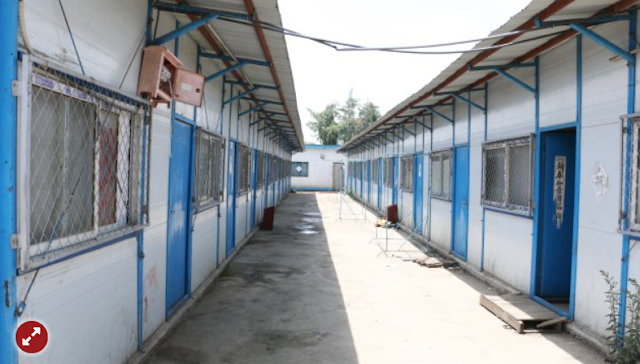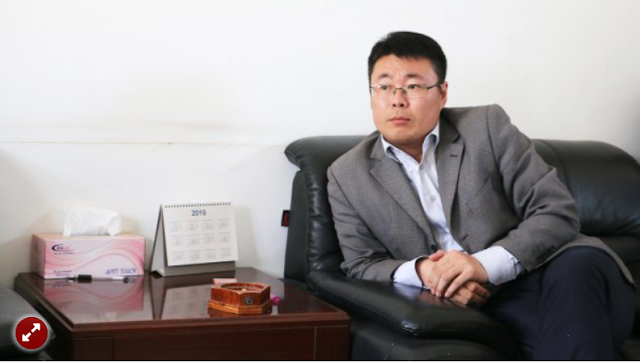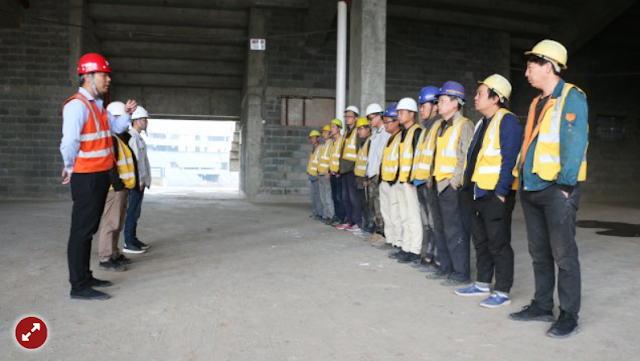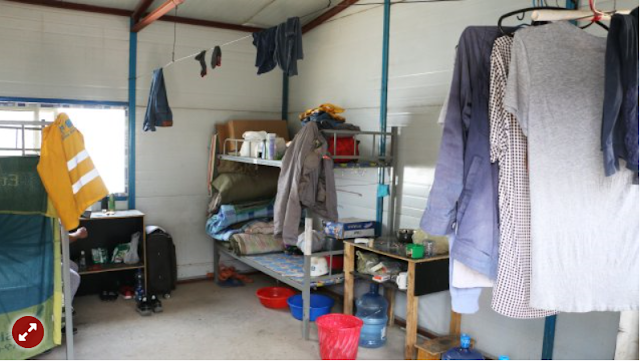The Chinese Builders Behind Africa's Construction Boom
By Heike Klovert in Addis Ababa

Specialists from China are erecting massive buildings across Africa, including Ethiopia's new national soccer stadium. The workers must leave behind their families and move to faraway countries. But the money is hard to beat.
Xu Dingqiang's position at the top of the construction site hierarchy is apparent in the way he dresses. Work pants, steel-toed boots, hard hat, reflective vest. Not all the workers here have access to such equipment. But the 47-year-old has an important task.
Xu is in charge of installing electrical and sanitary equipment in the future stadium of Ethiopia's national soccer team. The building stands out from the maze of streets that surround it in Addis Ababa, as if a spaceship had landed in the center of the Ethopian capital.
Xu hurries up through the stands where up to 60,000 spectators will soon sit and cheer. At the uppermost level, he enters a dimly lit restroom where 10 of the stadium's 1,000 toilets have been installed. The lights don't yet work and the floor tiles are covered by a layer of construction dust. A colleague speaks to him in their native dialect from Jiangsu province in eastern China. Xu stands with his legs apart and his arms crossed in front of his chest.

The two specialists work for the China State Construction Engineering Company, or CSCEC, one of the largest construction companies in the world. The Adey Abeba Stadium, the roof of which will ultimately look like the shell of some primeval lizard, is one of the Chinese state-owned company's showcase projects. It is also busy erecting glamorous new headquarters for the Commercial Bank of Ethiopia in Addis Ababa and Africa's tallest skyscraper in Egypt.
The CSCEC is just one of many Chinese companies, whether state-owned or private, that have been feverishly building new skyscrapers, roads, railways, stadiums and dams in Africa. The China Africa Research Initiative at Johns Hopkins University in the U.S. estimates that African countries borrowed in the neighborhood of $143 billion (130 billion euros) from China's government, banks and entrepreneurs between 2000 and 2017.
But who are the people behind this construction boom? And what is it like for them living in Africa?
'If This Were China'
Xu has finished inspecting the toilets and leans against one of the stadium's concrete balustrades, gazing out on a panorama of grass and bushes that will soon give way to sports fields and parking lots. Behind them are houses and buildings of various sizes and, in the distance, hazy hills. "If this were China," Xu says, "it would look much tidier here."
Xu has little opportunity to explore what the Ethiopian capital has to offer. He only leaves the fenced-in construction site two or three times a week to fetch snacks for his employees or items he needs for his job. Addis Ababa is considered extremely safe compared to other African cities, but Xu doesn't navigate the city on foot, and he doesn't go alone. He's heard of other Chinese people who were mugged. "I'm a little scared," he says.

Xu Dingqiang, the head of electrical and sanitation at the construction site, says he enjoys the mostly rainless Ethiopian weather.
It is estimated that more than 200,000 Chinese are currently working for Chinese and foreign companies in Africa. Many, like Xu, move from country to country. Before coming to Addis Ababa, he helped build the new port in nearby Djibouti. Before that, he says, he was in Germany, Spain and Greenland.
These global Chinese migrant workers mostly keep to themselves. They live in temporary barracks or apartment blocks, communicate with native workers in an amalgam of Mandarin, English and the local language and generally have little contact with the general population of their host country.
Some Chinese, of course, have settled in Ethiopia, having found a wife and started a family or perhaps opened a shop or restaurant. Most, however, return home to their families in China sooner or later. They are primarily drawn to far-flung construction sites like the one in Addis Ababa by the money.
A Win-Win Situation
Xu took the job in Ethiopia two years ago because he was eager for something new -- and because he earns twice as much as back home. Plus, he gets free room and board. He left his wife and children in Jiangsu and moved into barracks next to the stadium in Addis Ababa. In the evenings, he surfs the web and watches Chinese movies before falling asleep in his metal bunk bed.
Xu's life consists of little more than work and he's hardly seen anything of his host country in the past two years. He does like the Ethiopian climate, though, because it hardly rains. Rain is impractical for construction workers.
His position as head of electrical and sanitation has at least earned Xu the right to live alone. Lower-ranking workers have to share, with eight of them packed into a single room. In Xu's space, there is enough room for a somewhat homespun-looking desk and for cable reels stacked on the bare concrete floor next to his bed. Xu has placed three pairs of shoes on the welded reels, next to a cardboard box of dried seaweed. There is no wardrobe.
Dormitories for Chinese workers
For Xu and many of his colleagues, their work on the African continent is a clear win-win situation. "We are helping African countries to develop," he says. China brings skills, specialized workers and surplus material to Africa to expand its infrastructure and build new trade relations. All sides benefit. When Xu talks about it, he uses words like growth and business. Terms like colonization or debt trap are not part of his narrative.
Clear Hierarchies
One may find this way of thinking to be lacking in nuance, but its not entirely false. For three years, as many as 200 workers from CSCEC and other Chinese subcontractors have been working alongside at least three times as many Ethiopian workers. The men form teams, with one Chinese handing out assignments to several Ethiopians.
The roles are clearly distributed -- and the social divide is obvious: CSCEC employees wear hard hats, work boots and reflective vests with the company's logo. The Ethiopian workers and the employees of Chinese subcontractors, meanwhile, often wear only jeans, sweatshirts, light shoes and no head protection. Can such an unequal cooperation really work?
In one of the stadium's basements, 18-year-old Abdullah Abdulrahman is grouting tiles in a washroom. He's from the countryside, but a few months ago, he approached the stadium's steel gate and asked for work, as did most of the locals who work here. He's happy to be earning money and learning something new in the process. "I like working for the Chinese," he says.
The young Ethiopian women who prepare Chinese food in the kitchen for the foreign workers are similarly grateful. So too are the Ethiopians leveling the sand in the arena where the turf will ultimately be installed. They, too, have only positive things to say, even when no Chinese person is listening.
Only one of them complains, saying he'd like to earn more. But he's not about to go out and look for a new job. The job security is better here than at other construction sites in Ethiopia, he says. One of his Chinese superiors sometimes yells at him, he says, but that could just as well happen with a local boss.
Cultural Differences
Chen Yu manages the construction site and speaks openly about the difficulties that his job entails. "The biggest problem," the 37-year-old says, "is the Ethiopians' work ethic. Most of them don't like working overtime." While the Chinese work nine to 10 hours a day, the Ethiopians usually work only eight, he says. Plus, if they show up late to work and have their pay docked as a result, Chen says they'll show up in his office to complain.
Any Ethiopian who is ambitious in his job can earn a raise, the manager says. But very few do. Most of them have practically no technical qualifications and it's a laborious and costly process to train them for the job, he says. It's absolutely possible, Chen adds, that his Chinese colleagues might sometimes lose their temper.
The civil engineer has a rather critical opinion of the African country and its people. On one hand. On the other, Chen says he respects and admires the Ethiopian culture. "Ethiopians are much more spiritual and not as materialistic as the Chinese. They seem happy, even if they don't own much," he says.
Chinese workers attend a regular security briefing inside the stadium.
Five translators work on the construction site to clear up misunderstandings that can arise due to different ways of thinking or doing things. Chen and his employees also do their best to stay out of the cultural and political wranglings of their host country.
It's around 6:30 a.m. on a recent morning and all of the Chinese specialists have gathered for one of the regular safety briefings at the stadium. They are lined up beneath the stands, hard hats on and hands in their pockets, as they listen to a superior.
He tells them that a few days ago, the head of the Ethiopian army and a provincial governor were shot dead. He goes on to say that ethnic groups in the country are at odds with one another, and that it is therefore important to act neutrally to all sides. The superior adds that it would be best to avoid giving tips altogether, lest one arouse envy or resentment among others.
A Stadium-Sized Life
This state-imposed neutrality is another reason why African heads of government are so fond of doing business with the Chinese. It's the stuff of dreams: A big-scale investor who helps poor countries without asking critical questions or making demands, like the Europeans are wont to do before releasing funds.
Xu, the installation manager, and Chen, the head of the construction site, would therefore rather not comment on the fact that the Ethiopian national soccer team is currently ranked 146th of 210 teams by FIFA, which makes the gigantic stadium they are building in the middle of the city seem like wasteful political symbolism.
And what might happen if Ethiopia and other developing countries can't pay back their loans to the Chinese? To what extent do countries' economic dependence spill over into a political dependence? Here, Chen's and Xu's answers are in lockstep with those of the Chinese government. Unlike the West, Chen says, China has never colonized another country. "We all want to grow together," he says.
Dormitories like this one can accomodate four to eight Chinese workers.
It's time for lunch. Chen takes a seat in the wide leather armchair in his office and Xu retires to his room. He wants to take a nap in his bunk bed before returning to the unfinished toilets. Soon, Xu will return home for a few days -- to his children, his wife and the Chinese snacks that he misses. Afterward, he intends to return to Addis Ababa. The stadium isn't finished yet.
When he does return to Ethiopia, Xu's world will shrink back to the size of a little bit larger than a soccer field. But this doesn't bother him, he says. "We don't think much about our lifestyle here. We're just here to work."





0 comments:
Publicar un comentario